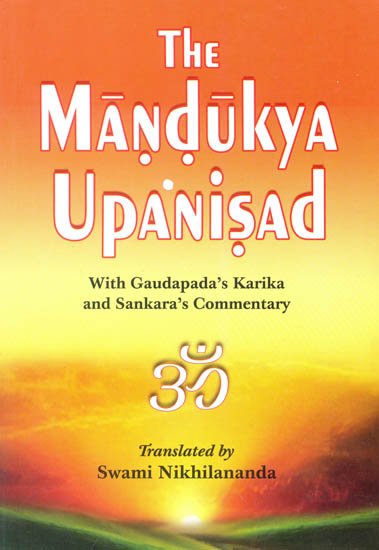Mandukya Upanishad (Gaudapa Karika and Shankara Bhashya)
by Swami Nikhilananda | 1949 | 115,575 words | ISBN-13: 9788175050228
This is verse 1.11 of the Mandukya Karika English translation, including commentaries by Gaudapada (Karika), Shankara (Bhashya) and a glossary by Anandagiri (Tika). Alternate transliteration: Māṇḍūkya-upaniṣad 1.11, Gauḍapāda Kārikā, Śaṅkara Bhāṣya, Ānandagiri Ṭīkā.
Mandukya Karika, verse 1.11
Sanskrit text, IAST transliteration and English translation
कार्यकारणबद्धौ ताविष्येते विश्वतैजसौ ।
प्राज्ञः कारणबद्धस्तु द्वौ तौ तुर्ये न सिद्ध्य्तः ॥ ११ ॥kāryakāraṇabaddhau tāviṣyete viśvataijasau |
prājñaḥ kāraṇabaddhastu dvau tau turye na siddhytaḥ || 11 ||11. Viśva and Taijasa are conditioned by cause and effect. But Prājña is conditioned by cause alone. These two (cause and effect) do not exist in Turīya.
Shankara Bhashya (commentary)
The generic1 and specific2 characters of Viśva, etc., are described with a view to determining the real nature of Turīya. ‘Kārya’ or effect is that which is done, i.e., which has the characteristic of result. ‘Kāraṇa’ or the cause is that which acts, i.e., it is the state in which the effect remains latent. Both Viśva and Taijasa, described above, are known as being conditioned by cause and effect,3 characterised by both non-apprehension and mis-apprehension of Reality. But Prājña is conditioned by cause alone. Cause, characterised by the non-apprehension of Reality, is the condition of Prājña. Therefore these two, cause and effect, i.e., non-apprehension and mis-apprehension of Reality, do not exist, i.e., are not possible in Turīya.
Anandagiri Tika (glossary)
1 Generic—The generic or the common characteristic of Viśva and Taijasa is that they are, both, characterised by the conditions of cause and effect.
2 Specific—The special characteristic of Prājña is that it is characterised by the causal conditions alone.
3 Cause and effect—Causal state is that in which we do not know (agrahaṇaṃ) the Truth. From it follows the result (phalaṃ) which is the mis-apprehension of Truth (anyathāgrahaṇaṃ). It is because one does not know the rope one mistakes it for the snake (phalaṃ). Prājña or the state of non-apprehension as such is said to be the cause of the Viśva and Taijasa or the states of mis-apprehension. In dream and waking states there are both non-apprehension and mis-apprehension of Reality. But in deep sleep, there is only non-apprehension. As a matter of fact these two conditions, mis-apprehension and non-apprehension, cannot be experienced separately. They have been differently classified only to facilitate understanding.
